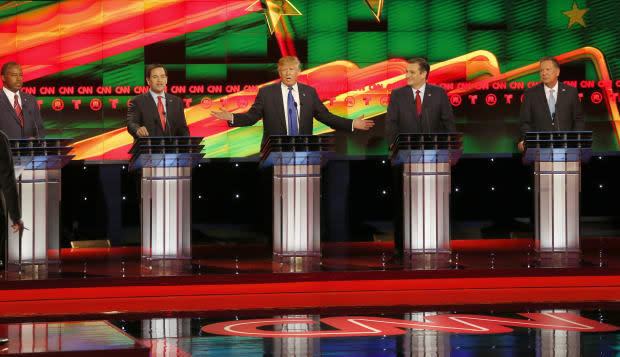5 Job Interview Tips to Steal From Presidential Candidates

By Susannah Snider
In one telling moment on a January episode of "The Tonight Show Starring Jimmy Fallon," presidential candidate Donald Trump submits to a mock job interview.
"I mean, you're running for the biggest job in the world, really the most important job," says Fallon, before picking up a clipboard and asking Trump about his strengths and weaknesses.
It's true. Presidential candidates are, in essence, interviewing for one very big job while their constituents serve as hiring managers and interviewers. "We have this huge search going on for our president," says Cheryl Hyatt, CEO and partner at Hyatt-Fennell, an executive recruiting firm based in Pennsylvania. "And the people of the United States, and those who are voters, are actually playing the role of the search committee."
As we watch candidates fight for the presidency, job hunters have front-row seats to a master class on interviewing, networking and self-branding. The candidates, after all, do a lot of things right – and a few things wrong. Here's what job seekers can learn from following the 2016 presidential race.
1. Your back story matters. You know that all-too-common interview question: "Tell me about yourself." A good presidential candidate has his answer down pat. Marco Rubio's narrative begins with his hardworking immigrant parents. Trump highlights his business expertise. Hillary Clinton talks about her years in politics and often mentions her middle-class upbringing in Illinois.
Take note, job hunters. It helps to have a ready-to-go CliffsNotes version of who you are and why you're applying. "You need to have the narrative of your career," says Suzanne Bates, CEO of Bates Communications in Massachusetts and author of "All the Leader You Can Be: The Science of Achieving Extraordinary Executive Presence." Keep it short but know which relevant details of your work history to include. You can even mention a few personal facts.
2. Perfect your sound bites. "My recommendation to job seekers is to treat interviews like debate prep," says Joe Weinlick, senior vice president of Beyond, a Pennsylvania-based online career network that connects job seekers with employers.
Presidential candidates know the power of an effective one-liner – and so should you. Practice answers aloud so that you can speak clearly and succinctly while sounding engaged. Tell stories to illustrate your credentials, and aim to sound polished without coming off as scripted.
3. Know your audience. Just like voters, hiring managers have a knack for recognizing canned answers and soulless responses. Rubio caught heat for delivering the same practiced phrases during a Republican debate. Savvy job candidates won't fall into that trap. They know that different audiences – and different job postings – require different approaches. They will tweak their resumes and interview responses to better link their experiences with the responsibilities of different roles.
"It's not enough to have one version of a resume," Weinlick says. "Have customized versions of a resume, making sure that if you go into an interview, you can bring any of those alive with relevant stories."
4. Develop your brand.Job seekers need a "crystallized sense of self," Bates says. A strong candidate knows who she is as a product and gets that message across in her resume, interview, on LinkedIn and on any other social media platform or website. To paraphrase another president: It's not what a potential employer can do for you, it's what you can do for your potential employer.
Presidential hopefuls have teams of people who poll voters and analyze campaign footage to pin down their political brands. While you probably don't have a focus group at your disposal, try talking with mentors or peers about how they see you professionally, Bates says. Ask them what they think your strengths are and how they'd summarize your contributions to your employer. "You'll be amazed at what people tell you," Bates says.
5. Kissing babies is optional, but shaking hands is not. Presidential candidates know when it's time to work a room by shaking hands, making introductions and posing for selfies with voters. While toddlers may not be allowed at your networking functions, it's still essential to make in-person and online professional connections.
Having a strong network can earn you first dibs on a new job opening and may land your resume on top of the interview pile. Says Weinlick: "The person most likely to get an interview is the one who was introduced by a colleague, not the one who submitted the resume online."
